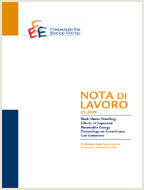Sensitivity of Modeling Results to Technological and Regional Details: The Case of Italy’s Carbon Mitigation Policy

17.03.2017
C68, Q5, Q55
Computable General Equilibrium, Carbon Mitigation Policy, Sensitivity, Technology, Sub-national regions
Climate Change: Economic Impacts and Adaptation
Francesco Bosello
Energy Economics, vol. 63, pages 116-128
Watch the video presentation by FEEM researcher G. Standardi
Model differences in technological and geographical scales are common, but their contributions to uncertainties have not been systematically quantified in the climate policy literature. This paper carries out a systematic assessment on the sensitivity of Computable General Equilibrium models to technological and geographical scales in evaluating the economic impacts of carbon mitigation policies. Taking Italy as an example, we find that the estimation for carbon price and the economic cost of a de-carbonization pathway by means of a model with technological and regional details can be lower than a model without such details by up to 40%. Additionally, the effect of representing regional details appears to be far more important than the effect of representing the details of electricity technology in both the estimated carbon prices and the estimated economic impacts. Our results for Italy highlight the importance of modeling uncertainties of these two key assumptions, which should be appropriately acknowledged when applying CGE models for policy impact assessment. Our conclusions can be generalized to different countries and policy scenarios not in terms of absolute numbers but in terms of economic explanations. In particular, intra-national trade and the sub-national sectoral/technological specialization are important variables for understanding the economic dynamics behind these outcomes.
***
Suggested citation: Gabriele Standardi, Yiyong Cai and Sonia Yeh, Sensitivity of Modeling Results to Technological and Regional Details: The Case of Italy’s Carbon Mitigation Policy, Energy Economics, ISSN 0140-9883, http://dx.doi.org/10.1016/j.eneco.2017.01.021
